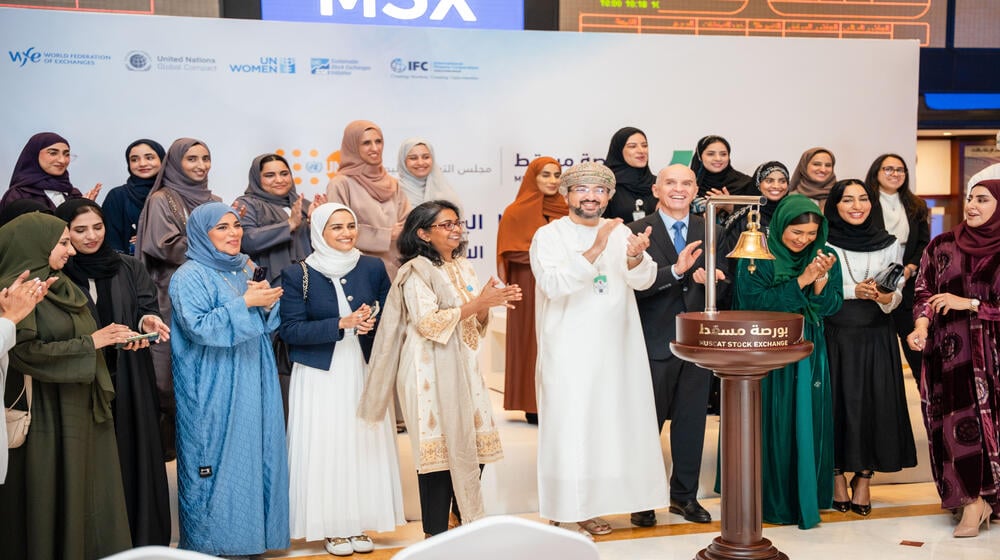In celebration of International Women's Day, which falls on the 8th of March every year, the Muscat Stock Exchange, in collaboration with the United Nations Population Fund (UNFPA) GCC office, organized the “Ring the Bell for Gender Equality” event which is a global initiative between stock exchanges around the world, marking the event by
ringing the opening or closing bells to celebrate International Women’s Day. The initiative is a partnership between the United Nations Entity for Gender Equality and the Empowerment of Women (UN Women), the International Finance Corporation (IFC), the Sustainable Stock Exchanges Initiative (SSE), the United Nations Global Compact (UNGC), and World Federation of Exchanges (WFE) to raise awareness regarding the business aspect of women’s economic empowerment and the opportunities for the private sector to advance gender equality and sustainable development.
The event commenced with a panel discussion which addressed the importance of empowering women economically, and the role it plays in contributing to achieve Oman's Vision 2040 and the Sustainable Development Goals set by the United Nations. Several experts and specialists participated in the discussion, chaired by Mr. Ahmed Al-Mukhaini, from the Office of the Chief Executive Officer of the Capital Market Authority, and included Dr. Fatima Al-Hajri, Director of Training and Capacity Building at Petroleum Development Oman, Ms. Hajer Al-Mamari, Chair of the Women's Committee for the Oil and Gas Sector at the Labor Union, and Ms. Shatha Abdulmajeed Al-Zadjali, Director of
the Organizations and International Relations Department at the Omani Human Rights Commission.
The discussion covered various topics, including the active role of women in the Omani economy, their valuable contribution to economic stability, and ways to sustain their participation in the labor market. Challenges facing working women were also discussed, along with the importance of empowering and supporting women at all levels to
influence positive impact on society and as a fundamental pillar for building inclusive communities.
On this occasion, Majida Al-Mamari, Sustainable Investment Officer at the Muscat Stock Exchange, stated that women are essential factors in sustainable investment, possessing unique capabilities and skills that contribute to sustainable development and an economy based on environmental, social, and economic principles. As the Stock Exchange is one of the leading institutions in the Omani economy, it has undertaken the responsibility to implement triple governance standards in listed companies and lead the financial community towards sustainable investment.
She added that providing equal opportunities and appropriate training enables women to play a key role in developing and implementing sustainable investment strategies, whether in business sectors, civil society, or government. Al-Mamari pointed out that the Muscat Stock Exchange is a permanent member of the United Nations Sustainable Stock Exchanges Initiative (SSE), as the initiative aligns with the strategies of Oman's Vision 2040 to achieve sustainable and flexible economic growth through a package of strategic programs in triple governance, including social governance that enhances social inclusion by providing employment, education, and healthcare opportunities for all segments of society and supporting women and youth in the labor market.
On his part, Karl Kulessa, the UNFPA Representative for Gulf Cooperation Council countries indicated that "It is essential for businesses in Oman to cultivate inclusive work environments that value and respect the contributions of women", highlighting the importance of inclusive workplaces.
Concluding the panel discussion, the importance of investing in women and economically empowering them in various sectors to improve sustainability practices was reiterated. Participants were encouraged to commit towards ensuring the rights of women and girls in all aspects of life to build prosperous and equitable economies and achieve sustainable development goals.


